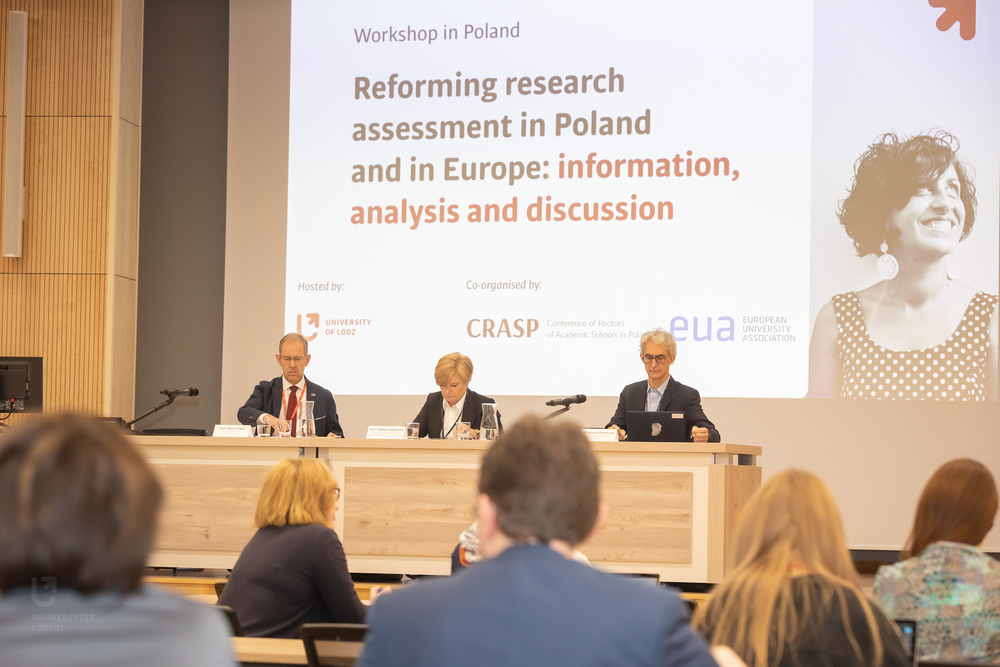The decision to join COARA was made after the CRASP-EUA workshop on reforming research assessment, which took place on 26 October 2022 at the University of Lodz. During the workshop the participants learnt that there is a growing coalition of reformers who want to change the way science is assessed in Europe. The University of Lodz authorities decided that we would be a part of this grassroots movement, joining 16 other research institutions from Poland, such as Polish Academy of Sciences, University of Warsaw or Jagiellonian University, which have already signed the declaration of cooperation.

Dr Stephane Berghmans, photo: Maciej Fornal, Promotion Centre, University of Lodz
Dr Stephan Berghmans (EUA), said that if the member institutions joined COARA by 17 November 2022, they would co-create the new initiative from the very beginning because the General Assembly would be held on 1 December. That is when the management positions will be appointed and the final shape of the organisation will be determined.
This is a unique opportunity for researchers and academics to discuss the final version of the agreement on the evaluation of the research reform, as well as the latest developments in the management and work of the future Coalition for Advancing Research Assessment (CORA).
By joining COARA, the institution undertakes to reform its research assessment system within five years. In other words, the university undertakes to develop a new system, in compliance with the 10 principles contained in the programme declaration:
Core commitments
The core commitments include two commitments that are crucial (“what we want”) and that will enable better recognition of the diverse practices and activities that maximise the quality of research.
1. Recognise the diversity of contributions to, and careers in, research in accordance with the needs and nature of the research.
2. Base research assessment primarily on qualitative evaluation for which peer review is central, supported by responsible use of quantitative indicators.
The next two core commitments are to enable a move away from inappropriate uses of metrics (“what we don’t want anymore”).
3. Abandon inappropriate uses in research assessment of journal- and publication-based metrics, in particular inappropriate uses of Journal Impact Factor (JIF) and h-index.
4. Avoid the use of rankings of research organisations in research assessment.
Supporting commitments
The supporting commitments include three commitments to enable the move towards new research assessment criteria, tools and processes; and three commitments to facilitate mutual learning, communicate progress and ensure that new approaches are evidence informed.
5. Commit resources to reforming research assessment as is needed to achieve the organisational changes committed to.
6. Review and develop research assessment criteria, tools and processes.
6.1 CRITERIA FOR UNITS AND INSTITUTIONS
With the direct involvement of research organisations and researchers at all career stages, review and develop criteria for assessing research units and research performing organisations, while promoting interoperability
6.2 CRITERIA FOR PROJECTS AND RESEARCHERS
With the direct involvement of researchers at all career stages, review and develop criteria, tools and processes for the assessment of research projects, research teams and researchers that are adapted to their context of application
7. Raise awareness of research assessment reform and provide transparent communication, guidance, and training on assessment criteria and processes as well as their use.
8. Exchange practices and experiences to enable mutual learning within and beyond the Coalition.
9. Communicate progress made on adherence to the Principles and implementation of the Commitments.
10. Evaluate practices, criteria and tools based on solid evidence and the state-of the-art in research on research, and make data openly available for evidence gathering and research.
COARA is a pan-European coalition to reform how we evaluate research on our continent. During the process of evaluating the proposed assumptions, a group of eminent intellectuals was asked to evaluate the assumptions of the Coalition in one word. The dominant word turned out to be:
FAIRNESS.
 Photo: Maciej Fornal, Promotion Centre, University of Lodz
Photo: Maciej Fornal, Promotion Centre, University of Lodz
We encourage you to use the links below to extend your knowledge about COARA and its objectives.
Full recording of the CRASP-EUA workshop on reforming research assessment, which took place on 26 October 2022.
COARA – Coalition for Advancing Research Assessment
EUA – European University Association
It brings together more than 850 universities from 49 European countries. It has a great influence on the direction of education development on the old continent. It represents universities in major discussions and recommends the most beneficial solutions for the development of education.
CRASP – Conference of Rectors of Academic Schools in Poland
Source: COARA
Edit: Promotion Centre, University of Lodz

